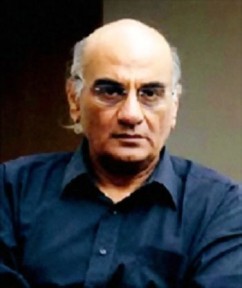Many many years ago, I saw a bit of Mani Kaul’s debut film Uski Roti on Doordarshan and what struck me even though I was a child then, was a cinematic vocabulary unlike any I had seen or had been exposed to. This film had pauses and long moments of silence when no one seemed in a hurry to rush life. Not a note of music. Just the human experience of an acute, tongue-tied loneliness. A woman waiting with food for a trucker husband who may come. Or not. The dialogue when it happened was not directed at the audience but was part of the truth unfolding almost in real time on the screen. It had no flourish. It was bare just like the film and yet you felt, you were not watching a make-believe narrative but sitting on a charpoy, basking in sunshine in your yard, lost in thoughts that no one was privy to.
In retrospect, it is obvious why the majority of movie goers in India never discovered him. Our cinema is by and large about punchlines, not silences. It is external, not introspective. It is about orchestrated flourishes and here was a dhrupad singing teacher of cinematic nuances and film maker whose films were not really cinema but distilled extractions of life. And the fact that he never saw the kind of slavish, cult following that today’s film makers acquire just by creating shocking counter points to main-stream commercial cinema, is not to his discredit. He was not in the number game. He was not playing to win. He was not hoping to create an alternative empire by sneezing at decorous, cinematic conventions.
He was not a media puppeteer or a marketeer. He was just someone who did not care about making any point but to just capture in his cinema, the truth of the story he was trying to tell. That is what it was all about. To tell a story in its purest form.Without any ornamentation. Mani lore goes that he was a student of human nature, of the essential truth of a person, the core ingredient of the spirit that decides how we will live, create films or cook food or tell stories or make art or music. He was true to his own nature and remained so till the end even though in a success and formula driven industry, few film makers are able to retain their creative innocence.
Even with roughly 24 credits, among them milestones like Ashad Ka Ek Din, Duvidha (which was remade by Amol Palekar as Paheli ), Satah Se Uthata Admi, Dhrupad, Mati Manas, Siddeshwari, Ahmak (Idiot) (starring Shahurkh Khan), it was tough for him to rally resources for ideas he wanted to film due to the enormous odds that creatively integrated people always have to face. Especially in populist, mediocrity driven industries.
The Ritwick Ghatak protege lived long enough to see Indian cinema evolve and devolve and continued to plan films even if he could not make them. He continued to help his students and followers with their journey. He could have been hurt by what Neville Tuli described as a “general apathy towards certain values” and the lack of respect for intangibles like “intellect, integrity, creativity and honesty.” His biggest success though is that he remained truthful and uncompromised till the end. His success is that through his integrity as film maker and a teacher, he inspired many creative talents to walk their own path, speak in their own voice.
He was part of a certain generation of greats that gave the Film and Television Institute of India (FTII), its most memorable chapters but what will remain even if it is not documented or catalogued or celebrated, is the invincibility of an idea. The idea that for every Manmohan Desai, there is a Mani Kaul and somehow both can co-exist at the opposite ends of the creative spectrum. And even though even a Manmohan Desai could not beyond a point, deal with the aftershocks of success and failure and personal issues, Mani though disillusioned with the ways of the market forces, never gave up or gave in. If that isn’t a slap on our face, I don’t know, what is. The negatives of two of his landmark films are lost but those who were lucky enough to experience them, the aftertaste lingers like the memory of a perfect, uninterrupted summer day.
Reema Moudgil is the author of Perfect Eight (http://www.flipkart.com/b/books/perfect-eight-reema-moudgil-book-9380032870?affid=unboxedwri )






